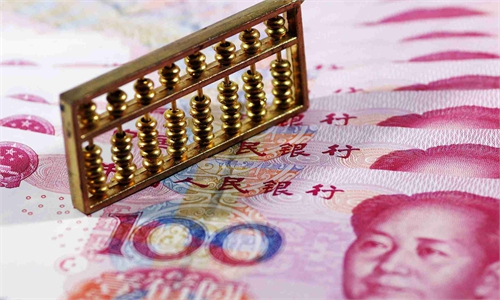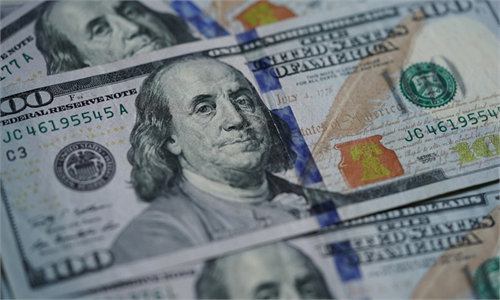More countries ditch dollar amid growing calls for reshaping global financial system

An oil and gas ship berthed at the wharf of the CNOOC LNG receiving station of Dapeng New District in Shenzhen, South China's Guangdong Province on May 17, 2023. It marks the completion of unloading of China's first cross-border LNG trade with yuan settlement. Photo: cnsphoto
The global de-dollarization move is gaining momentum and seems unstoppable now, with more Latin American countries including Venezuela and Argentina joining the trend lately.
Analysts said this trend is inevitable, and the global revolt against the greenback money will offer the US a taste of its own medicine, as its abuse of the dollar's dominant position has caused growing pain for many emerging market economies.
Venezuelan President Nicolas Maduro said on Tuesday that his country will move forward on the path of ditching the dollar in economic transactions, pan-Arab al-Mayadeen TV reported.
"This is the path of Venezuela and the path of a free economy, where currencies are not used to punish countries and impose sanctions," Maduro said.
Venezuela's move follows the heels of Brazil and Argentina. Brazil in February signed a memorandum of cooperation with China to phase in yuan-clearing arrangement in Brazil, while Argentina's imports from China are now settled in yuan, instead of the US dollar, starting this month.
Revolt against US
It is of significance for Latin American countries to reduce reliance on the US dollar, as the US' aggressive financial tightening has led to serious inflation in Latin American countries, hollowing out of foreign exchange reserves and growing debt pressure, Wu Hongying, head of the National and Regional Research Center of Hubei University, told the Global Times.
"Latin American countries previously had close economic relations with the US, but the US' hegemony and abuse of economic sanctions have exposed the disadvantages of overly relying on the dollar," she said.
They fret the US may impose sanctions on them if there emerge discrepancies with the US interests, Wu said, noting that de-dollarization will help them prevent such risks.
Depositing non-dollar currencies at their reserves, such as the yuan, will help diversify risks and promote their own industrialization, said Wu.
In addition to Latin American countries, the de-dollarization trend is enveloping other places too, with 85 countries and regions having reportedly joined the drive, including major economies like China, Russia and India.
"The American dollar this time is coming to an end," renowned US investor Jim Rogers said in an interview, Russian media Sputnik reported Wednesday. "No currency has been on top more than 150 years… People have moved away from whatever currency it is," he said.
Weaponization of dollar
The de-dollarization move is actually triggered by US government' own hegemonic actions, Cao Heping, a renowned economist at Peking University, told the Global Times on Thursday.
In order to ease economic problems at home, the US Federal Reserve has raised interest rates 10 times in just a little over a year, which has seriously affected the monetary and financial system stability in emerging markets and developing countries, Liang Haiming, chairman of the China Silk Road iValley Research Institute, told the Global Times on Thursday.
Irresponsible US monetary policy has time and again caused negative spillovers to developing countries, including the 2008 sub-prime loan debacle in US which caused a global financial crisis, the Fed's ultra-loose monetary policy after the outbreak of the pandemic in 2020, and the Fed's radical financial tightening, have all hurt other economies severely.
"More worryingly, the sweeping US sanctions imposed on Russia and seizure of Russia's overseas wealth in the wake of the Russia-Ukraine conflict sent a sober warning about the risk of the US' weaponizing the dollar," Cao said, noting that these reckless moves are destroying the dollar's credibility and ditching the dollar is in fact "de-risking".
Last but not least, as the US is no longer the largest trade partner of many economies and the global share of the US economy drops, it's natural for other countries to bypass the US dollar by seeking alternatives.
System reshaped
Concerns about US dollar and doubts about its credibility will prompt more countries to flee from the greenback, and a diversified monetary system may be introduced one day, analysts said.
De-dollarization will be an improvement for global trade and monetary transactions, Cao added.
Looking ahead, the use of currencies that provide sufficient convertibility, liquidity and stability will grow, for example the yuan and the euro, he said.
Amid the global de-dollarization trend, the share of global reserves held in the US dollar fell from 71 percent in 1999 to 58.4 percent at the end of 2022, a record low for the dollar.
Meanwhile, the share of the dollar in central banks' foreign currency reserves is increasingly replaced by gold and other currencies. According to a report by the World Gold Council, central banks across the world bought a total of 1,136 tons of gold in 2022, up 152 percent year-on-year.
"Amid major changes unseen in a century, growing geopolitical tensions and fluctuations in the global financial market, the internationalization of the yuan faces some challenges but also unprecedented opportunities," Liang said, noting that the yuan will play a more important role in international settlements.
The outstanding balance of all foreign currency swaps was 109 billion yuan ($15.6 billion) as of the end of March this year, according to data released by the People's Bank of China, the central bank, on Monday. That was about 20 billion yuan more than the level at the end of 2022, the second-biggest quarterly jump on record.
"If China continues to steadily and prudently promote the yuan's internationalization, it's expected that the yuan will become the third most used currency after the dollar and the euro in about 10 years," Liang said.
He stressed that China's push for the internationalization of the yuan is to reduce the country's reliance on the greenback and ensure its own economic and financial security.


